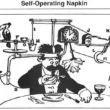When you or I travel to another country, the first thing we do when we land is change some US dollars into the local currency. Perhaps you change enough to get a cab to the hotel, go out and buy a meal, etc. For the duration of your stay you keep changing your dollars into the local currency to get around. Then when you are ready to leave, you take whatever you have left and you convert it back into dollars, or spend it, or give it away, and board the plane back to the United States.
Yet imagine that there are some travelers to whom special privilege is granted. When they go to a foreign country, they are allowed to take a small machine that prints out the local currency. If they are in Paris, it prints out Euros. If they are in London, it spits out British Pounds. When in Mexico City, it prints pesos. And so on and so forth. On every trip, however, this special “currency machine” keeps track of how many Euros, pounds, or pesos it has spit out. When its owner goes to the airport to leave the country, a government official reads the machine’s printout and makes the traveler settle his account. For example, if the traveler visits Paris, then as he stands in the airport ready to depart, the official reads his machine and says, “Monsieur, you printed out €1,000 (one thousand euros) while you were here. At today’s exchange rate that is equal to $1,500 US.” The traveler hands over US $1,500 in cash, then boards his plane for the US.
Why are such boxes allowed? Because the people to whom this privilege is granted are wealthy hedge fund managers and Wall Street brokers. It is more convenient for them to carry these currency machines, and print what is in effect “temporary” local currency, than to do what the rest of us do, changing currency every morning at our hotel’s front desk. Besides, they’re rich. Everyone knows they are good for it: in fact, when one of them arrives in a new country, before he gets to use his curency machine he has to prove that he is wealthy, so that no matter how much local currency he prints and spends, he’ll have the dollars to buy them all back at the end of his trip, at current exchange rates. That way, when he is ready to leave the country and at the airport his machine is read to find out how much of the temporary local currency he printed on his visit, and that number is converted into US dollars, he can simply reach into his valise and pull out the requisite cash, even if it is thousands, or millions, of US dollars.
Imagine now that between the two Caribbean nations of St. Bart’s and St. Maarten’s there is a small island nation, St. Smallcap. It may be poor in comparison with the United States, but it has a working, even vibrant, economy. Its currency trades at parity with the US dollar (that is, one of the first converts to one of the other, and vice-versa). No one knows what the future holds for St. Smallcap. Perhaps it will stay as it is for generations. Perhaps it will develop into a prosperous island nation like Bermuda. Maybe it will become a destitute, impoverished nation like many other small island nations. Perhaps it will become an economic powerhouse, like Hong Kong or Singapore. There is no way to tell.
One day, as if on cue, a dozen hedge fund managers and Wall Street bankers show up in St. Smallcap. No one thinks much of it as these fellows start driving around Smallcap with their special machines. They print off the local currency with great abandon, using that currency to buy drinks and dinners on the town, pay for taxis, and gamble at the casino. In time, they begin buying the island’s houses, cars, yachts, and cargo ships. They even buy Smallcap National Airline’s sole 727 jet. They buy anything that is not nailed down, paying for it all along with the local currency, which they print off their special currency machines as they need it.
After a few weeks something funny begins to happen. There is so much extra currency floating around, it begins to affect the economy. As everyone realizes that there is a lot of extra currency sloshing around the island, prices for goods rise in anticipation that Smallcap’s currency will become less valuable. It may even happen that prices soar, as they did in Weimar Republic Germany after WWI, in a bout of hyper-inflation. Of course, as this happens, the rate at which Smallcap’s currency can be exchanged against other currencies, including the dollar, collapses.
There is an even more insidious effect, however, that one can understand by thinking about the nature of prices. There are many ways to think about prices. Often we see them simply as obstacles preventing us from getting what we want (“Jim wants a new Mercedes but on his teacher’s salary he cannot pay the price.”) Another way to think of prices, however (a way many economists think of them), is to see prices as little bits of information passing back-and-forth around the economy, permitting millions of strangers to coordinate their economic activities. Prices for corn are going up and prices for wheat are dropping? That is a signal to farmers that they should cut back on wheat production and plant corn instead. Rents soar in a city while prices for office space stagnate? That is a signal that someone should convert some office space to apartments and condominiums. A city is washed out because of a hurricane, and prices for flashlights are soaring? That is a signal to surivivors within the city to share the scarce resource of flashlights, and a signal to outsiders to start trucking in flashlights for resale (i.e., “profiteering,” which to economists means, “responding quickly to price signals without regard for ethical concerns such as loyalty”).
Like any other normal economy, in order to function St. Smallcap’s economy relies on prices to pass information around the economy. The hedge fund managers and their special currency machines, however, print out so much of their “temporary” currency that Smallcap’s economy becomes awash in it. Imagine listening to a radio playing across the room while someone plays white noise in speakers set up next to your ears: you would not be able to hear what was being said. Similarly, this flood of “temporary” currency washes out the signals that prices normally carry within St. Smallcap’s economy. No one knows whether to grow wheat or corn, and since seed prices are rising but no one knows what income can be generated from any crop, fewer farmers plant anything. Savings drop: it makes less and less sense to save, because what is the point of delaying consumption today in return for a future benefit that cannot be estimated? Since less money is being saved, banks have less capital to loan to businesses to expand, or even maintain, current production. As a result, manufacturing on the island also collapses.
One can imagine a situation where, if Smallcap’s economy were small enough, and the Wall Street bankers and hedge funds swept down on Smallcap with enough currency-printing machines, that they could flood Smallcap with so much of its own currency that the price signals of the local economy would be mostly lost. The white noise of massive amounts of this “temporary” currency would disrupt real economic activity, like farming and manufacturing, until the economy of Smallcap cracked. Hyper-inflation, starvation, and mass unemployment might set in. People would begin trading anything they have in return for a ticket to flee the island.
Throughout it all, the Wall Street bankers and hedge fund managers continue using their machines to print local currency with which they can buy, buy, buy.
After six months, when nothing of value is left on the island that they do not already own, the bankers and hedge fund managers take everything they bought and load it onto their new cargo ships and yachts. They gather at the airport to board their new jet.
A government official arrives and sets about to find out how much of the local currency they printed while visiting the island. The official reads the print-out from each of their machines, sums it up and exclaims, “100 million!”
One hedge fund managers speaks for the rest: “Yes, but that is not 100 million US dollars. It is 100 million in your local currency. And while we have been visiting your country your local currency seems to have collapsed. That is hardly surprising, given that your farms are vacant and your factories are boarded up. It seems that on the international markets your currency is worth 1/10,000th of what it was worth when we arrived six months ago. Thus, in US currency, we owe you precisely… $10,000.” He flashes his thick wallet and counts out the sum. Laughing, his hedge fund colleagues and banker friends board their jet and take off, banking to watch their new cargo ships sail out of the harbor loaded with the wealth of the country, for which, in the end, they paid $10,000.
Imagine also that surprisingly few reporters seem interested in these events, or notice the pattern of it happening to one small island nation after another. Those who do notice it take it for granted that small island nations are supposed to be the way they are: destitute and impoverished. Only rarely does a reporter challenge the bankers and fund managers on their actions, but the financiers respond in unison so perfect it appears rehearsed, “Are you kidding? Don’t you know what a dump that island is? The last time I saw St. Smallcap its farms were barren, its businesses were boarded up, and everyone was fleeing. I tell you, the place is just a disaster.”
If you can understand the story above, then you can understand the crime that is occurring in our financial markets (the metaphor is a sound one, if I say so myself). The point of subsequent posts in this category will be to convert the story you just read into Wall Street lingo, one step at a time. You will see how the preceding story precisely expresses behavior that is occurring on Wall Street, routinely, today.
In reality, of course, the “special machines” that bankers and hedge fund managers are using are not actual physical machines, and what they are destroying are not “small island nations,” and what they are printing is not “currency.” In reality, the “special machines” are loopholes in our legal system, what the bankers and hedge funds are destroying are small companies, and the “currency” they are printing off to do so are shares of stock in those small companies.




Clarify this for me, please. It seems similar to naked short selling.
A stock of a well-rated company suddenly starts printing more shares and selling them so that instead of 150,000,000 original shares, there are 200,000,000
shares circulating. The first offering (that I am aware of) was made for exploration and expansion. The 2nd offering, there was no explanation, so I assume it was in financial trouble due to the crash.
Share prices go up and down with the economic news, so it doesn’t appear to have any negative effects.. I can understand that it dilutes their core value, but it doesn’t affect their daily price chart.
This seems familiar with your analogy above about naked short selling, but
I can’t quite grasp how this affects me, owner of their shares. Would someone please explain it to me?
Massive selling of “simulated “ shares, (created by a system of IOU’s out of sold call options and bought put options) or “real” shares (created by a promise to locate at a later date), cause the price to drop.
Powerful high frequency trading computers using the latest algorithms guarantee a profit between every bought and sold transaction while performing a calculated sell, sell, sell, buy, sell sell sell ad infinitum, causing share price to drop.
Shares sold but not yet bought, with promise to deliver end up NOT delivered. They enter FAILED TO DELIVER category FTD, again guaranteeing a profit for short sellers: they keep the money without ever buying the shares back. FTD’s stack up into the millions ( hundreds of millions, billions?) and wait until the company under attack goes bankrupt ie: BBBY where the slate gets wiped clean, all FTD’s evaporated.
The extra benefit enjoyed by the short sellers is NO TAXES due. The rip off of retail investors, including pension funds also includes reduced taxes, which equates to less for public spending.
Private hedge funds have less oversight, less regulation which allows for more egregious tactics against their targeted companies.
Another tactic used by the large players is dark pool trading: after the markets close they trade huge amounts amongst each other coordinating further down ward pressure. Process the majority of buy orders in dark pool, trade them for a later due date, then process the sell orders heavily during the day, reflecting a lower price.
This leads to false pricing: a vastly lower price vs the actual price it would be in a daytime auction market.
This only covers a small portion of the rehypothecation perpetrated in our stock markets.
A few days ago (October 14, 2009) Matt Taibbi wrote an article (http://www.rollingstone.com/politics/story/30481512/wall_streets_naked_swindle/print)about naked short selling for the Rolling Stone. However, in one part of the article he writes
“Here’s how naked short-selling works: Imagine you travel to a small foreign island on vacation. Instead of going to an exchange office in your hotel to turn your dollars into Island Rubles, the country instead gives you a small printing press and makes you a deal: Print as many Island Rubles as you like, then on the way out of the country you can settle your account. So you take your printing press, print out gigantic quantities of Rubles and start buying goods and services. Before long, the cash you’ve churned out floods the market, and the currency’s value plummets. Do this long enough and you’ll crack the currency entirely; the loaf of bread that cost the equivalent of one American dollar the day you arrived now costs less than a cent.
With prices completely depressed, you keep printing money and buy everything of value — homes, cars, priceless works of art. You then load it all into a cargo ship and head home. On the way out of the country, you have to settle your account with the currency office. But the Island Rubles you printed are now worthless, so it takes just a handful of U.S. dollars to settle your debt. Arriving home with your cargo ship, you sell all the island riches you bought at a discount and make a fortune.”
His example, though summarized, seems awfully lot like this one right here. I don’t know if he gave credit to this author but if he didn’t, it seems that there may a case of plagiarism here.
Anon
Very good explaination of this “crime”… As a small investor this type of transactions hurts me a lot :(, and I think to small companies also.
The St. SmallCap example is flawed. Thus is can’t be used as a metaphore. Here’s how it is flawed:
In a properly managed Medium of Exchange (MOE), the money is “a promise to complete a trade”. The governing relation is INFLATION = DEFAULT – INTEREST. The manager of the MOE “loans” money (certificates) to traders in exchange for their trading promises. The promise would be to return the certificates at an appointed time and place. A trade takes 3 steps: 1) Negotiation; 2) Promise to deliver; 3) Delivery. In simple barter, steps 2 and 3 happen simultaneously and on the spot. When money is created in step 2 and reclaimed in step 3, the trade can take place over time and space. If full deliver is not made and the certificates returned, you have DEFAULT. By the relation, INTEREST collections are made equaling these defaults. This assures that INFLATION is zero.
The author’s example is flawed. Sure, these big spenders are putting a lot of trading promises into the marketplace. But they have to return certificates as agreed. In the author’s example, they didn’t return certificates … they returned something they claimed to be of equal value. There is the disconnect. The MOE manager cares nothing about prices or value. All he cares about is certificates. The traders have to figure out the prices and value for themselves. When the MOE is properly managed, INFLATION is “guaranteed” to be zero at all times and at all places. Thus, this abundance of currency will not change prices. Only supply and demand for the individual goods can affect the prices.
Todd Marshall
Plantersville, TX
Greetings people, I just located an excellent internet site for personality playthings. This website has really low prices on one of the most popular personality toys around. There are Disney toys, LEGO playthings, STAR BATTLE playthings, Teenage Mutant Ninja Turtles playthings, Fisher Rate playthings, Wonder playthings, Superman playthings, Batman toys, Captain Wonder playthings, Spiderman playthings, Playskool playthings, Disney Infinity toys, as well as several other brands as well as types of toys and porcelain figurine. The website offers protected payment as well as fast shipping with a full cash back guarantee.